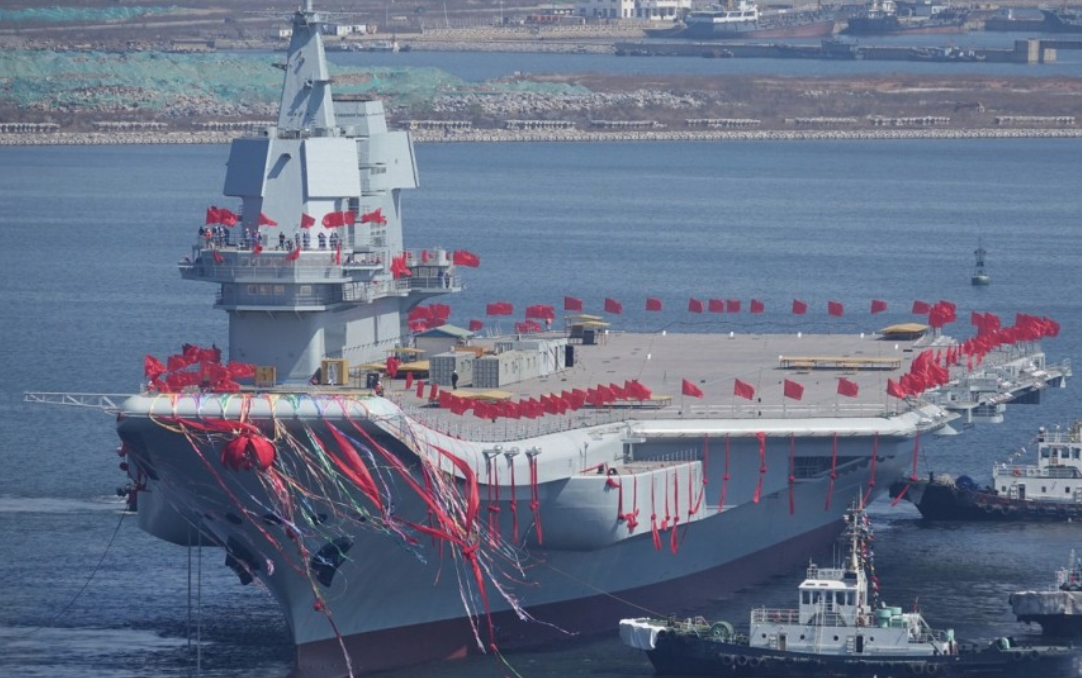China’s third aircraft carrier under construction, to launch in 2020?
Construction of the Type 002 (CV-18) began in March 2017 at the Shanghai Jiangnan Shipyard Group, say reports. It will take years to build and test, before joining the Liaoning and Type 001A Shandong as China’s third aircraft carrier.


China currently has two aircraft carriers in service: the Liaoning, which was built more than 25 years ago, bought from Ukraine, and renovated, and the Type 001A Shandong, which was designed and built completely in China and launched in April 2017. The South China Morning Post reports that the Shanghai Jiangnan Shipyard Group was “given the go-ahead to begin work” on a third carrier in March 2017. The new carrier is called the Type 002, or CV-18.
- The building process will take years. A source told the SCMP that the “shipyard is still working on the carrier’s hull, which is expected to take about two years,” and that this ship will be “more complicated and challenging” than China’s two existing carriers.
- Naval experts expect this one and a fourth to be integrated into China’s navy by 2030. This will still be far short of the total in the U.S., which has at least 10 aircraft carriers in service — and more depending on your definition.
- The new carrier will use an electromagnetic launch system that was developed by a Chinese naval engineering team two months ago.
- The Type 002 will be launched in 2020, and enter service in 2023, according to estimates (paywall) from the Diplomat.
EARLIER THIS WEEK:
Thousands of protesters took to the streets on New Year’s Day to protest a high-speed railway being put under Chinese law, changes in legislative rules for the city, and the political persecution of pro-democracy advocates.
There are pitfalls and opportunities for France in China as President Emmanuel Macron prepares to meet Xi Jinping. Will France be able to stand up to China’s agenda?
Invasions of privacy (by Sesame Credit, on the private side) and a blacklist for small or subjective infractions (by the central government, on the public side) are making many question the integrity of a system designed to promote integrity.
- Fighting pollution and quitting coal
As China gets tough on pollution, will its economy suffer? / Economist (paywall)
“Probably not” is the venerable newspaper’s answer to its headline question, because, it writes, “the biggest economic surprise of China’s environmental campaign so far is not that it has had an impact; it is how muted that impact has been.”
Cold comfort: China’s Wuhan eases gas rationing as snow hits / Reuters - French president in Beijing
As Macron embarks on China tour, reciprocity is the word / Reuters
“Macron is expected to push for a more level playing field in trade relations, as France tries to cut a 30 billion-euro trade deficit with China.”
Airbus expects China jet order during Macron’s visit / Bloomberg - Soft power
China: The soft superpower / FT (paywall)
A series that includes a notable piece titled “China softens tone in drive for Asia influence” (paywall), detailing in particular how China is “accelerating efforts to repair long-strained relations with two traditional U.S. allies in the region, the Philippines and Japan.”
China’s soft and sharp power by Joseph S. Nye / Project Syndicate - Squeezing North Korea
China says will limit oil, refined product exports to North Korea / Reuters - Unpopular leaders of Hong Kong
Hong Kong replaces top law enforcement official amid row over Beijing’s ruling / RFA - Iran in the eyes of overseas Chinese activists
‘Hope and resonance’: Chinese dissidents rally around Iran protests / HKFP - Trump
Lady in red? Trump told to see China president as woman to help pronounce name / Guardian






